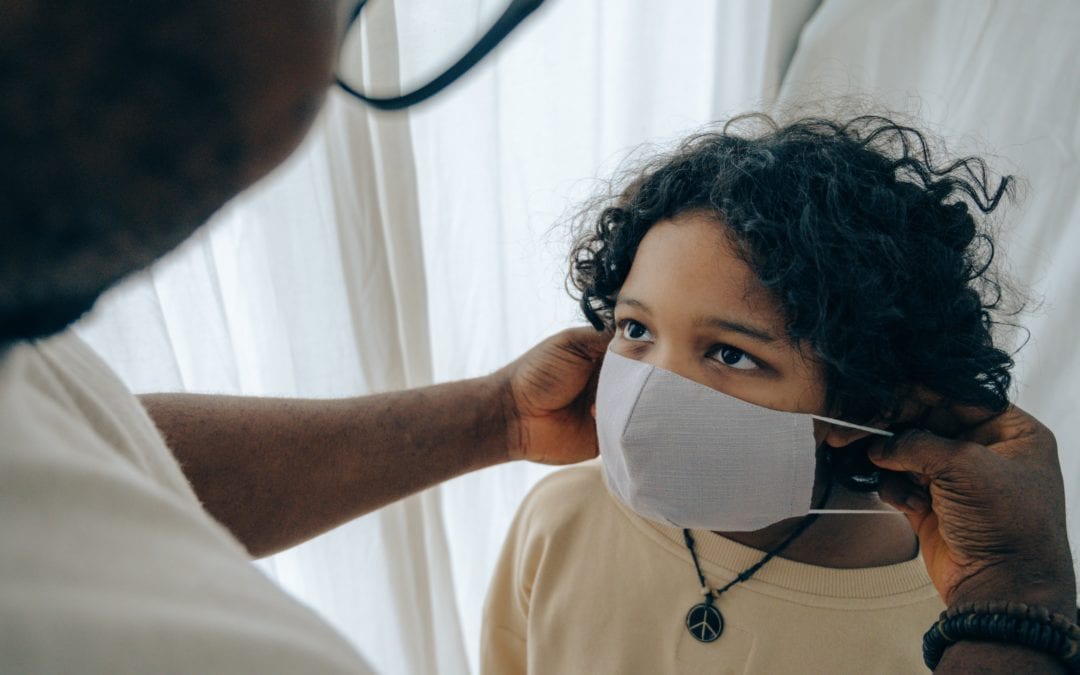Can you believe we have now been amid the COVID-19 pandemic for over a year? How has your child been coping during this time? My oldest daughter just turned 16, and we had big plans for this special milestone in her life before COVID existed. We talked about going on a cruise or to Disney World with her friends to celebrate her Sweet Sixteen. Over the past few months, she has been practicing to drive with her learner’s permit – and will soon get her license – with nowhere to go for now. The pandemic and social distancing have definitely thrown a wrench in her plans.
My five children (ages 3-16 years) have all been virtual schooling for the past year, while my husband works from home. While they love being able to roll out of bed later than usual, this set-up is far from perfect. They miss their friends and their regular activities. It is hard for them to stay motivated or take school seriously when staring at a computer screen all day. They fight, bicker, and annoy each other at times because they have been stuck at home together for so long. They miss birthday parties, family vacations, and just the “norm” that we were so used to.
And while we have all been trying to make the most of it all with a smile, I know that being a child in the middle of this is not easy.
It can be challenging as a physician mom to be sure your children have everything they need physically and emotionally during this time. That is especially true for those who have demanding schedules and physically cannot be there for their family. We spend so much time taking care of patients while balancing our family life, virtual schooling, taking care of the home, and everything else that has come with the pandemic. Although you may be emotionally and physically drained at this point, it is still so important to do what you can to be there for your kids.

Check-in
Plan for a daily or weekly check-in with your kids to see where they are emotionally. The pandemic has caused mental illnesses like anxiety and depression to increase. The best way to catch the early signs of illnesses like these is to have regular talks with your kids. Find out how school is going, how they’re generally feeling, and see how you can help. Do more listening than talking during these conversations. Allow your child to feel comfortable, and provide reassurance that you’re there for them no matter what. If you have more than one child, it is helpful to check in with each one individually so they can each be open and honest and also feel special because of the one-on-one attention.
Encourage family time
Your kids likely have not seen their friends and other family members much over this past year because of the pandemic. We have all spent a lot of time at home together (probably more than we wanted!). But, just being under the same roof does not mean that you are truly spending time “together.” Spending quality time as a family has been shown to reduce certain mental illnesses, boost your child’s mood, and improve their overall health. So, schedule a few intentional ours with your family on your calendar. A family movie night, game night, dinner, picnic, or time at the beach can be rewarding for everyone involved.
Allow safe activities with family/friends
While I am still super-vigilant when it comes to mask-wearing, sanitizing, and social distancing, I realize the importance of human interaction. If your child has a friend from a family that you can trust, it is okay to allow some in-person interactions. Being outside and wearing a mask is still ideal, though. If your child is craving some social interaction outside the home, figure out a safe way to make it happen, and do it!
Promote self-care
I have seen how easy it is for even the most responsible kids to forget to comb their hair, brush their teeth, eat regularly, and get enough sleep over the past year. Being stuck at home for months can cause just about anyone to backslide when it comes to self-care. Many of the children I see in my office every day are eating more than usual because they are bored at home. They are also getting much less exercise than usual by being sedentary. If you notice your child’s self-care is slipping away, encourage him to get back on track. Encourage getting up and dressed each morning, regular balanced meals, plenty of water, and daily trips outside. It is incredible what a little self-care can do when it comes to boosting your child’s mood!
March 13, 2019, will forever go down as the day the world shut down and changed forever. We are living in a very different and strange time. I could not imagine how it truly feels to be a child right now. The weight of this pandemic on our children can be way too much at times. So we must do what we can to lift the weight, meet their needs, and be there for them during this crazy phase. Hopefully, it will all be over soon!
Petra McEwan, MD, FAAP, IBCLC, is a practicing Pediatrician and Lactation Consultant in South Florida, where she lives with her husband and five kids. She is also a Women in White Coats Fellow. On her website, https://www.wifeymommydoc.com, she helps working wives and moms balance their many roles. She can be followed on Instagram and Facebook @wifeymommydoc.




